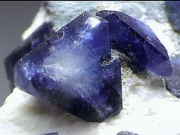Difference between revisions of "Benitoite"
Jump to navigation
Jump to search
(username removed) |
(username removed) |
||
| Line 12: | Line 12: | ||
== Authority == | == Authority == | ||
| − | * | + | * Thomas Gregory, ''The Condensed Chemical Dictionary'', Reinhold Publishing, New York, 3rd ed., 1942 |
| − | * | + | * R.F.Symmes, T.T.Harding, Paul Taylor, ''Rocks, Fossils and Gems'', DK Publishing, Inc., New York City, 1997 |
| − | * ''Encyclopedia Britannica'', http://www.britannica.com Comment: "Mineral." | + | * ''Encyclopedia Britannica'', http://www.britannica.com Comment: "Mineral." Encyclopædia Britannica. 2004. Encyclopædia Britannica Premium Service. 12 May 2004 . |
[[Category:Materials database]] | [[Category:Materials database]] | ||
Revision as of 06:26, 24 July 2013
Description
A deep blue, sapphire-like gemstone with fiery yellow flashes. Benitoite is composed of a barium-titanium silicate. These rare and valuable crystals have only been found close to the San Benito River in California. Benitoite stones were formerly cut and sold as sapphires.
| Composition | BaTi(SiO3)3 |
|---|
Authority
- Thomas Gregory, The Condensed Chemical Dictionary, Reinhold Publishing, New York, 3rd ed., 1942
- R.F.Symmes, T.T.Harding, Paul Taylor, Rocks, Fossils and Gems, DK Publishing, Inc., New York City, 1997
- Encyclopedia Britannica, http://www.britannica.com Comment: "Mineral." Encyclopædia Britannica. 2004. Encyclopædia Britannica Premium Service. 12 May 2004 .
